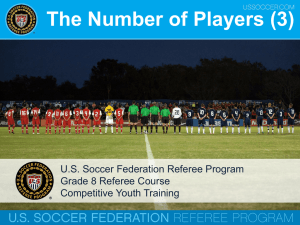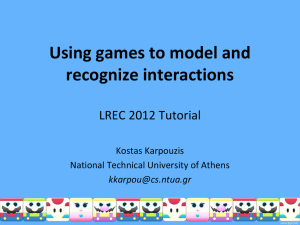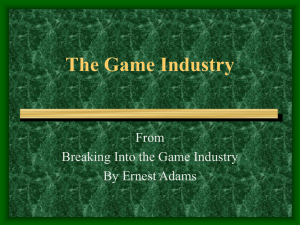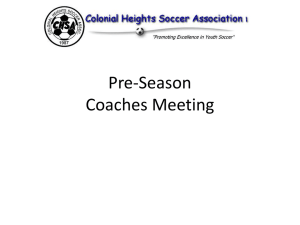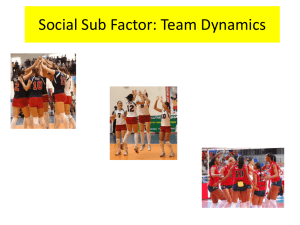Gerry Fitzpatrick - Mental Preparation
advertisement
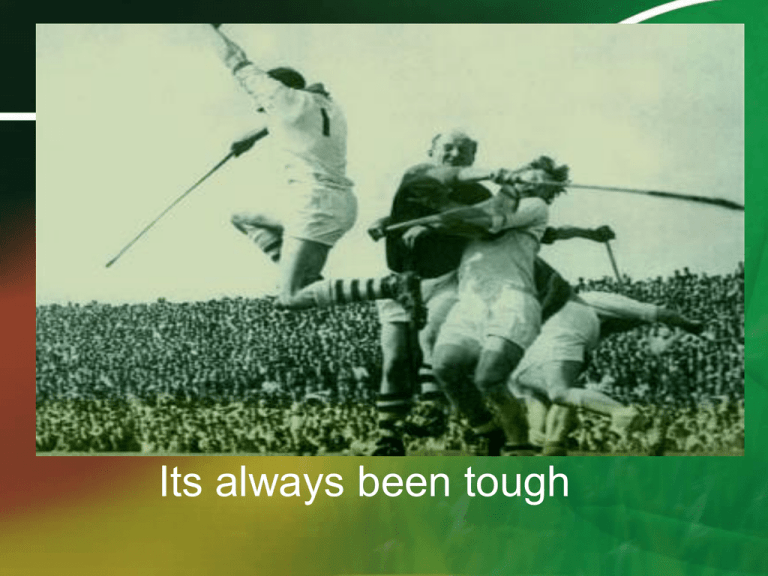
Its always been tough Its always been tough Its always been tough Its always been tough Mental preparation “A strong mind may not always help you win, but a weak mind will help you lose” “If you want something to change, you have to change something” Mental Prep happens anyway? The choice is to plan, implement and evaluate a mental preparation programme OR Talk about being committed, focused, etc, etc, and just hope for the best Player type influences mental preparation Task-involved players • When a player does something to acquire a skill or achieve something for themselves then they are said to be taskinvolved. • They focus on improving their skills and try to achieve their goals • They are players whose perception of their own ability is based on how good they themselves perceive their ability. • Task-involved players feel more understanding of game situations. • They are more concerned with intrinsic motivation. • Studies indicate that task-involved players felt their efforts were more noted when they received positive feedback and they judged that their efforts must be lower when there was negative feedback provided to them (Duda et al, 1995). Ego-involved player • An ego-involved player “seeks to demonstrate his or her own ability comparatively to others and if mastery is experienced it is, as a means to an end”. • In a state of ego-involvement the concentration is on the quality of an player’s performance and this is demonstrated when they out perform others on the field. • This involves more extrinsic motivation. • Many players who are in an ego-involved state do not want to be seen putting in too much of an effort as they sometimes believe that high effort can be perceived as lacking in ability. • It was also thought that ego-involvement exists when an player believes his/her performance is reflected in the type of person that they are. • They are often the type of players that appear confident but may be lacking confidence (Deci & Ryan 1985) Mental Toughness Attributes • Robust self-confidence and a self belief your ability • Highly self motivated • Having a growth mindset as opposed to a fixed mindset • Self-discipline • Good decision making under pressure • Thrive on competition with self and others • Ability to sustain concentration and refocus when its lost Mental Toughness Types •Endurance Toughness •Big Shot Toughness •Head to Head Toughness •Superior Mental preparation Mental Plans • • • • • Pre competition plan Pre competition refocusing plan Competition plan Competition refocusing plan Post competition plan “Whatever your plan, if it doesn't get measured it doesn't get done” Match Day Prep Mental Preparation Cycle Goal Setting •How good is your outcome, process and performance goal setting •How well do you review your goals Confidence •Having a robust self-belief and a positive attitude Visualization •Develop vivid and controllable skills •Use all your senses and create good feelings Handling Pressure •Knowing how to handle pressure and maintain emotional control •Knowing your IP zone Team Role •Having role clarity and role acceptance •Being responsible for getting your job done Focus •Establishing good level of focus •Refocusing Match Day Prep Having good performance routines Practice the “what ifs” Goal Setting Concentration Confidence Team Role Visualization Handling Pressure Goal Setting Set – Do – Review Outcome Goals-Performance Goals-Process Goals The Why The What The How Goals are developed from Performance Profiling Performance Profiling Enhancing and Managing Confidence The expectations you as a coach have of a player and how you communicate them, to that player, plays a significant role in that player meeting your expectations Confidence High Confidence Low Confidence Low Confidence High Confidence Enhancing and Managing Confidence • Self-Knowledge • Work ethic • Positive self-talk • Goal achievement • Useful thinking • Attitude • Acting confident • Positive expectations • Positive Affirmations • Highlight performances Pre-requisites for Visualization There are 3 distinct types of visualization Receptive-Programmed-Guided Whereas everybody can visualise, the ability that is required to enhance performance through visualization is a skill that requires a great deal of training and practice and the ability to limit the interference of the thinking mind. Beware There is no short cut but lots of people offer a quick fix Visualization Use a mental warm-up Screen for visualization ability Inside or outside Use all the senses Real time Find a technique that works General first, then sport specific Quality sessions Set goals Dealing with Pressure • Understanding stress, nerves, anxiety. The “Apantlesis” effect • Charting pre-event feelings • Types of worries (demand, ability, consequence) • Useful V. Useless thoughts • 7 second control plan • Relaxation • On site adjustments • Anti-choking strategy Teamwork • Team Identity (performance not superficial) • Goals and roles • Role Rules (clarity, acceptance, performance, flexibility, tolerance) • Cohesion (social and task) • Get beyond the ego • Reinforcement application • The core of the team leads Concentration • Players must be able to develop appropriate concentration in the build up to a game • Players must be able to recognize quickly when concentration has been lost (body is on court but the mind has left) • Players must be able to refocus when they are aware that focus has been lost • Players must be able to manage their concentration throughout a game Situational Focus Predictable Events Unpredictable events • Normal Distracting Response • Normal Distracting Response • Refocusing Response • Ideal Distracting Response • Technique to assist the refocus • Technique to assist the refocus Game Preparation The 24 hour mental prep lead in Time Action Mental Prep 3pm Complete work Park all jobs 6pm Unwinding activity Relaxation Review goals 11pm Sleep PMR 9am Check equipment Visualisation/Highli ght clips 12pm Pregame meal Relaxed attention 2pm Arrive at venue Relaxed attention Refocus 2.20 Warm-up Mental warm-up 3 phase Routines (physical, mental, execution) 3 phase Routines (physical, mental, execution) 2.50 Final instructions Focus and centring technique 3.00 Game Optimal readiness Refocusing 4.30 What they leave with Debrief Aim is construct a pre-game routine that is controllable and portable (whatever match, conditions, opposition, you will be able to control your performance, by controlling your preparation). A good routine will enable you to be confident that you will produce a great performance • The checklist (kit, time, locations etc) • Avoiding the “wobblers” and expect “chaos” • Getting time and space • “What if “ scenarios • Making adjustments • Reality check Specific Situation Strategies Situations • Frees and Puck/Kick outs • Routines • Penalties • Present moment focus • Fights • Centring – refocus • Tactical changes at half-time • Relaxation – focusreinforce • End of game situations • Anti-choking strategy (handling pressure) Strategy Match Day Prep Mental Preparation Cycle Goal Setting •How good is your outcome, process and performance goal setting •How well do you review your goals Confidence •Having a robust self-belief and a positive attitude Visualization •Develop vivid and controllable skills •Use all your senses and create good feelings Handling Pressure •Knowing how to handle pressure and maintain emotional control •Knowing your IP zone Team Role •Having role clarity and role acceptance •Being responsible for getting your job done Focus •Establishing good level of focus •Refocusing Match Day Prep Having good performance routines Practice the “what ifs” Goal Setting Concentration Confidence Team Role Visualization Handling Pressure “No one can defeat us unless we first defeat ourselves” Dwight Eisenhower


